Join us in this informative episode as we delve into the crucial role of social impact data in philanthropy. Our special guest, Heather King, Vice President of Evidence and Implementation and Chief Ontologist at Impact Genome, will shed light on the importance of data-driven donor decisions and how it can transform the world of giving. Discover how providing donors with data can lead to more informed and impactful decisions, and how the industry is working to standardize social impact data.
Watch the episode:
Prefer to listen?
Read what we discussed
So in today's episode, my guest is Heather King. She's the Vice President of Evidence and Implementation, and Chief Ontologist with Impact Genome. Thank you very much, Heather, for joining us today.
Heather King (00:35):
Thank you. Thrilled to be here.
Karl Yeh (00:36):
In our previous episode with Jason from Impact Genome as well, we talked about social impact data, and if you want to watch that episode, highly recommend it. You can watch that in the description below.
But today we're talking more about donors and charities and data. So I guess the very first question I had was,
How do donors decide on which charities or nonprofits they give to?
Heather King (01:04):
Yeah, so this is a really important question because Americans in particular are donating a lot of money to a lot of charities.
So for example, in 2020, 60% of Americans donated to charities for a total of $471 billion, and they donated those charities to over 10 million nonprofits and NGOs worldwide.
So there is a lot happening in this space, and the way it's working right now is, donors are often selecting the most well-known charities because that's what they have information about.
They support charities that they have some personal connection to, and they often do it in a very ad hoc way.
So we're all familiar with campaigns; different times of year for different causes.
And it's not to say that those charities are bad charities to donate to, it's just if we're trying to solve some of these big problems, I think having more information about which charities are doing what specifically and how effective they are is going to give us better information about who should I give my money to?
Because right now it's more of an emotional process than a logical process.
Karl Yeh (02:12):
And it's pretty interesting because the big names, whether it's the Red Cross or Doctors Without Borders, but if you really want, I guess, donate to a cause that is doing a very niche or very specific thing, I guess that's very... For donors and I guess businesses themselves, there probably isn't a place to actually find all that information would there be?
Heather King (02:38):
Well, so actually we have a registry at impactgenome.org that has over 2.2 million charities in the US and Canada.
And we do essentially tag those with really specific outcomes that those charities are trying to affect.
So if you take something broad like let's say food security, which in this study was the outcome that we were using, if you think about food security, that's actually a lot of different outcomes if you want to get really precise. So you could give somebody a meal for a day.
You could give somebody groceries for a month.
You could help them know more about how to eat healthily. You could help them not only know that but do those things to eat nutritious food.
Or you could look holistically at are they overall food secure?
So they don't have to worry about food anymore.
They're getting all of the food that they need and want and what's culturally appropriate for them, and it's just not a concern for them anymore.
And at the same time, there's even bigger outcomes in food security, like the infrastructure to get food to people.
So when you say food security just as an example, that's actually a lot of different outcomes.
So if you want to, as you're saying, solve some of these precise problems, it may not even need to be a niche thing. It's just a matter of making sure that what you're donating to and supporting is the piece of that big problem that you want to be solving.
Karl Yeh (04:01):
So I think you've answered my second question, which is really
Why is impact data important for those donors on making the decisions for the charities or nonprofits they give to?
Heather King (04:14):
Yeah. And we just started out talking about individual Americans and the amount of money that they're donating.
If you actually look at the broader sector and you look globally and you include things like government spending and private philanthropy, and even some of the ESG spending that's out there, we did a quick landscape scan to determine what the size of that market is.
And what we found was that $72 trillion a year, which is an absolutely staggering number.
It's much greater than any defense spending or some of these other things that we think of as being things that we're spending a lot of money on.
And if you compare that to the sustainable development goals that the UN has put out, there are ways of tracking progress against those.
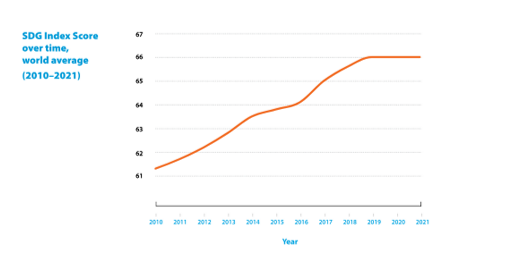
And so we've only made, I think something like 3% progress against those since 2014, and we've made no progress in the past two years.
So there's just a huge, huge mismatch between the amount of money that we're spending globally and what's actually happening on the ground and what's being accomplished.
And so not only is it important for individuals to understand "what cause am I really supporting?"
But I think broadly speaking, if we have more data on something like that food security outcome if what we really want to solve is food security overall, and we're donating a lot of money to giving people meals here and there, that might be why we're not solving that problem.
Because we don't have the right data to understand are we getting to the root of this?
So it is really important for us to have that kind of data because if you think about any other market, any other sector, they wouldn't make decisions for their businesses on emotion.
They would be using a lot of data to make those decisions, as they should.
And it's not to say that when you're donating to charities, you have to completely ignore the heart over the head, but the head has to have a role in it as well. And that's why providing this kind of data is so important.
Karl Yeh (06:12):
So can you tell us more then about what Impact Genomes study is and how they're providing that data to those donors?
How Impact Genome's Study provides data to donors
Heather King (06:23):
So what we did with our study, which was in partnership with a firm called Ideas42 who studies these things, and also with NORC, at University of Chicago, we use their Mayor Speak panel, which is a representative sample of the United States.
And what we did was we showed folks, and these are, it's a representative sample, so it's just everyday folks, and we showed them data on food security organizations.
So we did an experiment where for some folks we just showed them a written description, a couple sentences.
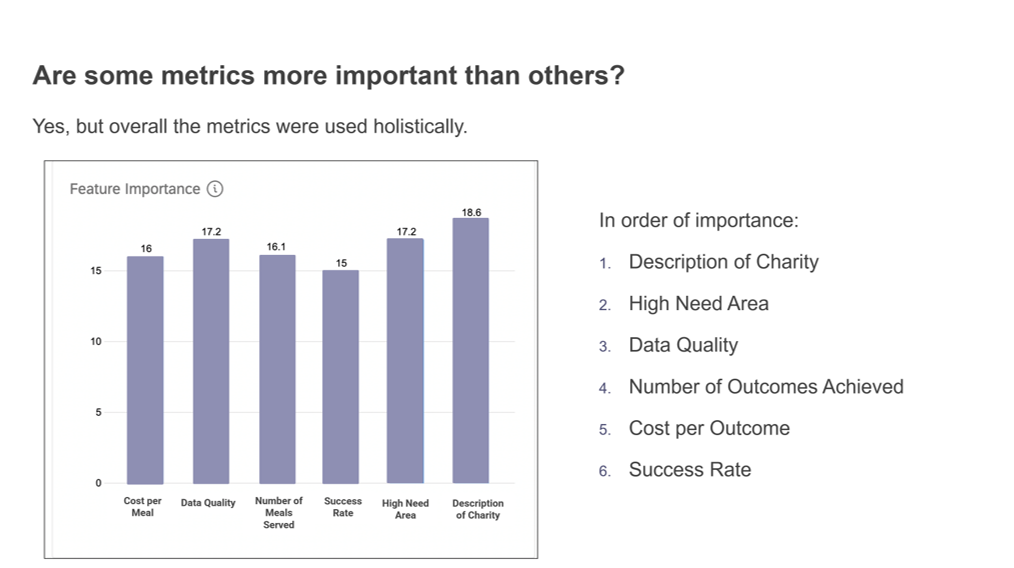
And then for others, they got to see not just that, but they got to see a bunch of data that went along with that.
So how effective was the organization?
How many people were they able to achieve an outcome for? What did it cost to do that?
Was it in an area of high need?
And so what we found was if we gave them all of that information and we tweaked it so that there was a very clear winner, if we looked at three charity side by side, there was one that had the best success rate and was reaching the most people.
And that was to see how do people react to that when they see that kind of information.
And what we found was there was something like a 70% increase in donations to that most effective charity compared to when they just saw the description, which was a few sentences.
And that kind of description is often what you do see out in the world if you're trying to figure out what charity to give to.
So that was really encouraging because we also saw that if you look at how each of those data points, all those things I mentioned, like the effectiveness and the cost and the number of outcomes, and we showed people a bunch of those scenarios like what you might do in market research; if I'm looking, trying to sell a new phone, what do people care more about?
Do they care about the screen size?
Do they care about the camera?
And so there are statistical methods for doing that.
And what we found is that folks care equally about all of those different data points.
So it seems like what they're doing is they're being very careful consumers of this information.
They're thinking really carefully about it, and they're not just relying on one thing.
They're not just relying on the description to make their choice.
They're not just relying on how cheap is this outcome to produce.
They did tend to lean a little bit more on the description, but overall it seems like they were being really holistic in the decisions they were making and making I think fairly sophisticated choices.
Karl Yeh (08:43):
Did this study also include... I know they take in all the data before they make their donation, but does it also include data to what happened after they made the donation?
What were the results after donor's made their donations
Heather King (08:58):
That's a great question.
So for this study, what we did is we pulled actual program data out of our registry.
I mentioned that a little earlier. So that's basically a list that is filterable of all of the different charities that we have information on in the United States.
And so we have all of that information from their previous year's impact.
So the scenario that we were trying to create was like, "Okay, it's the end of the year. I want to make some donations. I really want to make a good choice about who I'm donating to.
I want to make really sure that what I'm donating to is the cause that I really care about. So let me look broadly at what these organizations do, and then also what their impact was last year." So that's the kind of in information we got.
And we didn't have... The donations that we were working with were like $5 a person.
There was a random chance that folks would actually be able to make that donation.
So that did happen, but that might not be enough of a financial contribution to see a true impact in a next year's data. But what you could say is if it costs an organization $5 to produce an outcome and you gave them $5, then you did support that outcome because that is the true cost of producing it.
So that's one of the ways that we work with folks too and some of our clients in helping them take credit for the really good work that they're doing at a foundation. Here's the cost per outcome based on the data that we have.
And so if they funded half of the budget of that program, then they can claim half of those outcomes.
Karl Yeh (10:33):
How much different were the decisions once a donor received had access to the data versus donors who didn't have access to the data?
Giving decisions of donors with and without impact data?
Heather King (10:44):
So it was a pretty big difference. So if we looked at when they only had the description, those few sentences about the charity, we saw that it was pretty evenly split.
So we showed them three different organizations.
So people split between the three pretty evenly, but then if we showed them the data and charity A was clearly the winner, what we saw was there was an 80%, I said 70%, but it's actually an 80% increase in the donations to that charity.
So it's a huge shift.
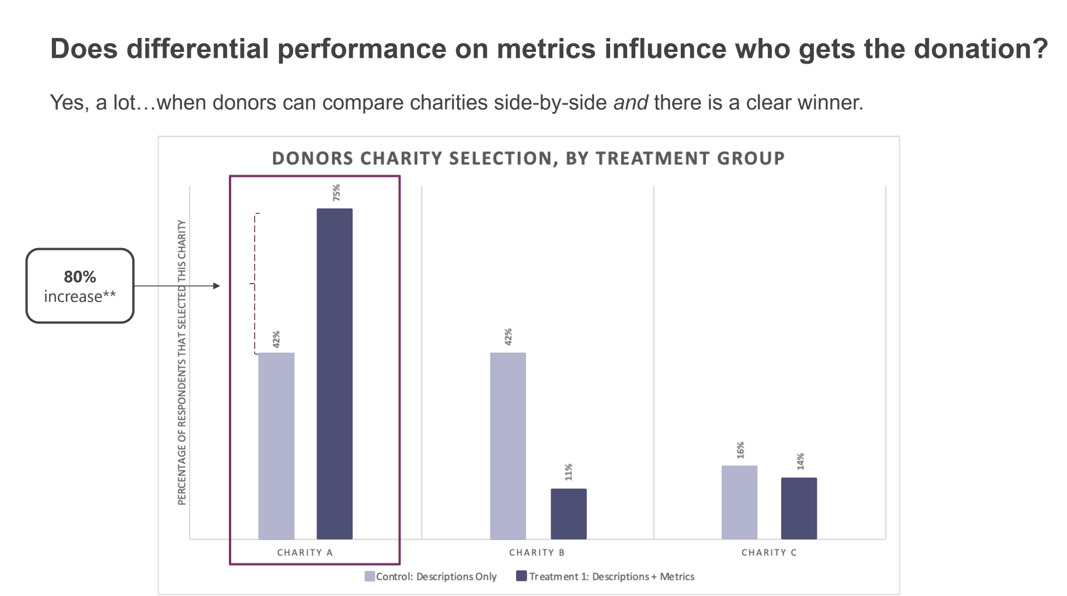
So if you didn't see the data, it was 42% of people chose that charity. If you did see the data, there was 75% of people that chose that charity, and the others dropped way down, and you could only choose one.
So it was a really, really big increase.
So that was really encouraging because it suggests that people are understanding this, and they are using that information to make a decision using that head over the heart, at least in this case, especially since they're all food security.
We're making good apples-to-apples comparisons between the charities. So it really just came down to what do the metrics say.
Karl Yeh (11:54):
I can see the importance of this both from charities and nonprofits that have ongoing work like Red Cross or Doctors Without Borders.
But how about those situations where disaster strikes, where donors want to give to specific charities or nonprofits that are trying to work specifically with the situation, manmade or natural disasters?
How does this registry, how does the data actually, how does the data benefit those donors who want to make those quick decisions on which charities to provide in those situations?
How does data benefit donors need to give immediately
Heather King (12:34):
Yeah, so that's a great question.
And I mean, the reality is unfortunately, these disasters are happening all over the world all the time.
And so there are charities that specialize in different types of disasters, and we do have standard of outcomes for those things having to do with disaster relief.
And so if you were interested in, let's say, supporting a charity that was working with Ukrainian refugees, for example, you could actually because we have these standardized data points, we have a way... Again, thinking back to filtering information.
If you have this kind of information that you can standardize and you make these kind of apples-to-apples comparisons, you could filter down actually in our registry, to the extent that we have that kind of information to say, "I want disaster relief organizations, and I want them to be in Europe, and I want them to be working with children," let's say.
And those organizations do exist because again, unfortunately, these things do happen and they would likely have data from prior years, even if the disaster that they're trying to address isn't exactly the same.
There are folks that are doing that kind of work that you would be able to support and have some idea of how successful they've been in the past.
Karl Yeh (13:53):
Let's shift to what's the next steps in collecting impact data for those donors, and how are you trying to make it so that all this data is easily accessible?
How accessible is this social impact data?
Heather King (14:05):
So we are collecting data on an ongoing basis. So we work a lot with foundations, private philanthropy, CSR, and we essentially will take in their grantee information. And the important thing here is that this whole registration process is structured.
So what happens is a lot of times when programs are reporting on their impact, it's filling out a form. It's typing a bunch of stuff and writing a bunch of stuff.
But this is a lot more something like TurboTax where there are options because organizations, a lot of them are doing similar things.
And so we can have dropdown menus of options for here's the type of impact that they're producing. Here's where they're doing that.
Here's who they're doing it with. Here's how successful they are. Here's how they're doing it.
And then all of that that can go into the registry.
And for our programs that go through that way, that are verified is what we call it, those are actually available on our website at impactgenome.org.
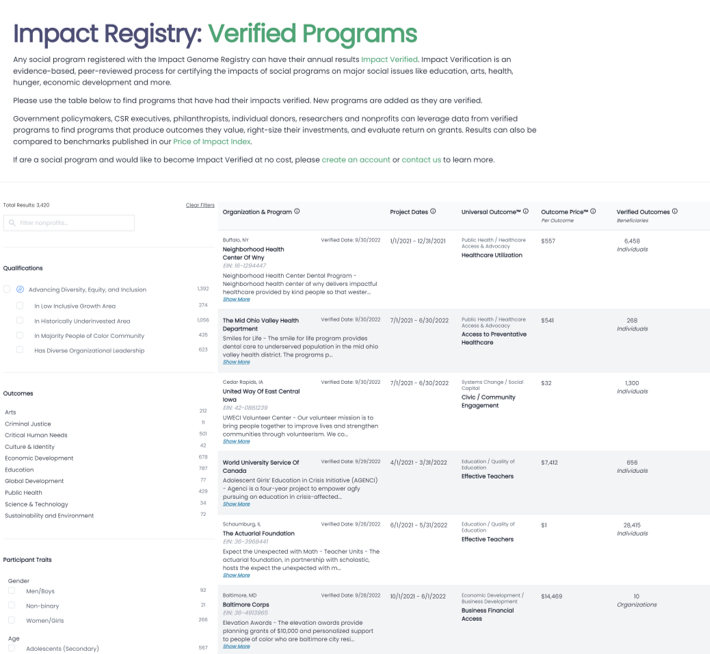
So anybody can go there and look at those. Right now, any nonprofit that wants to go through that process can do so for free, and they can get added to the registry, and it's something that folks can search and find them through.
Karl Yeh (15:17):
So Heather, if someone or a business wants to learn more or get involved with the registry, what's the best place for them to go?
Heather King (15:26):
So we're really excited to talk to folks, particularly in CSR foundations, to help them use these kinds of insights and get credit for the good work that they're doing, make even more precise decisions about who to fund, and just really optimize their grant making and their social impact.
So they can certainly go to our website at impactgenome.org and if they want to reach out to us directly, then they can email us at info Info@impactgenome.org, and we would be able to get back to them.

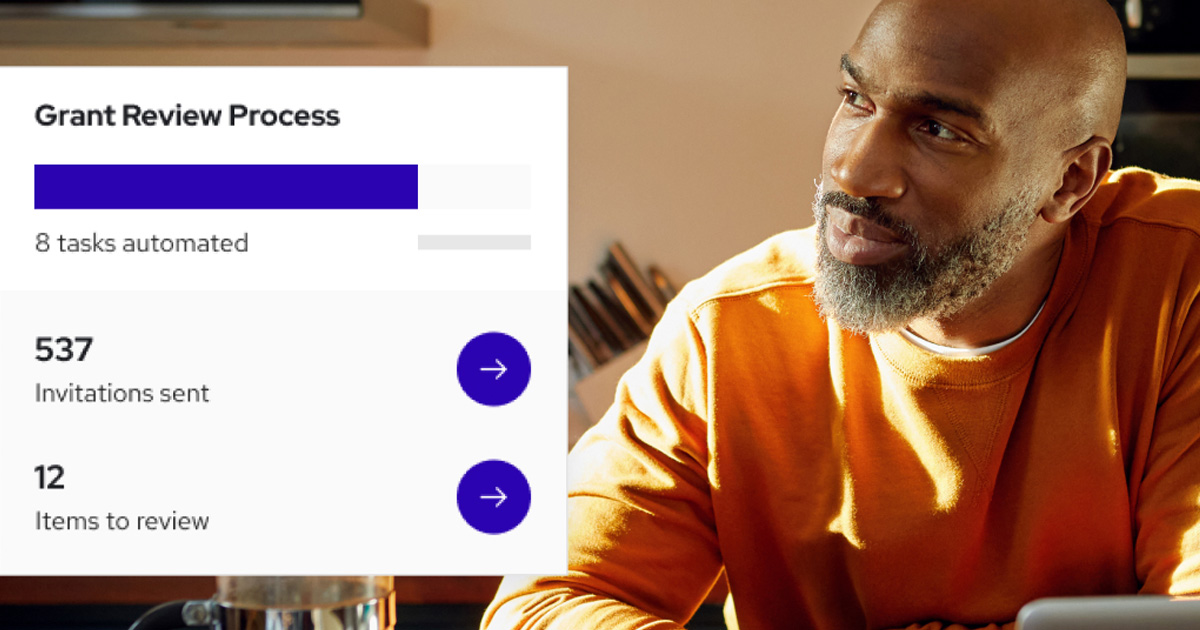

.jpg)




